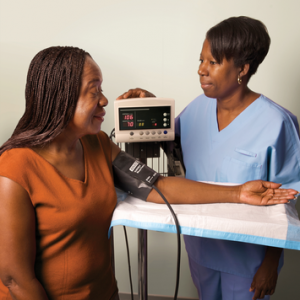Submitted by Yan Baum, MD of Kaiser Permanente
Last week, “Peter” came in for a physical exam where we found he had blood pressure of 136/86. I mentioned that his blood pressure is high. Peter said, “I feel fine. My blood pressure has always been around 130s/80s. All my previous doctors did not say my blood pressure is high. So, I am good.”
I have this same conversation about four times a day, every day. So I gave him some background info to understand what is going on and why it is important.
What is blood pressure?
Blood pressure is the force of blood on the walls of arteries as it flows through your body. Pressure is needed for the liquid to flow, just like water pressure is needed in your garden hose. The blood pressure is set by the strength of the pump (the heart), the stiffness of the blood vessel walls and the total blood volume.
Too little blood pressure and you may feel dizzy or faint as your vital organs are starved of oxygen. Too high blood pressure can cause the blood vessel to burst which can result in organ damage such as a stroke which occurs when a blood vessel bursts in the brain.

What is normal blood pressure?
“Normal” adult blood pressure is below 120/80. The first number is called the systolic pressure, the blood pressure when your heart beats to pump blood. The second lower number is the diastolic pressure, the blood pressure when your heart is between heart beats, refilling with blood.
Currently the diagnosis of hypertension (high blood pressure) is not consistent; it varies from 130/90 to 140/90. However, the definition of “normal” blood pressure as 120/80 is not changed. Above 120/80 is not considered normal.
What causes high blood pressure?
In most cases there is no clear cause of “primary” high blood pressure. Patient blood pressure rises with age, or due to genetics, lifestyle, stress, or drug side effects. It can also rise from lack of certain essential minerals, such as magnesium, potassium, or calcium, which the body keeps in balance with salt.
High blood pressure can be caused by cold and flu medicines with decongestants, some anti-depressants, NSAIDS (like aspirin and ibuprofen), steroids and several other types of drugs. Simply being dehydrated can drive up blood pressure. Birth control drugs can also increase blood pressure as can stimulant types of supplements. Also thyroid hormone imbalance (too high or low) can increase blood pressure.
Is it okay to have high slightly elevated blood pressure?
I went back to the conversation with Peter: Sustained elevated blood pressure over years can slowly damage blood vessels and many organs. If the blood supply is not good throughout the body, this can cause a variety of serious problems such as reduced blood flow to the heart or brain (coronary artery disease or stroke) or other serious heart problems (heart failure or atrial fibrillation).
In the U.S., about 30% of hypertension patients’ blood pressure is not under control, which means a large number of patients are needlessly vulnerable to catastrophic health problems.
Peter: I do not want to take any medicine. I want everything natural!
The early stage of elevated blood pressure may not need drugs. But it needs attention. Patients need the self-awareness to know the goal is normal blood pressure, 120/80, and to take concerted action. Blood pressure higher than 140/90 warrants a customized plan for each patient, depending on the patient’s condition (the age and the current medical condition).
I told Peter to consider taking steps to lower his blood pressure:
- Stress relief
- Exercise
- Diet modification
- Avoid alcohol or smoking
- Avoid some over-the-counter medication or herbs
It is vital to avoid having very high blood pressure, so use the drugs if your blood pressure gets very high or these other interventions aren’t working – it’s better than getting a stroke or heart attack. You can always go back and improve your lifestyle later after you get your high blood pressure under control via prescription.
If I am on blood pressure medication, is it forever?
No, if a patient’s lifestyle improves or if a patient loses significant weight, blood pressure can significantly decrease and the patient may be able to gradually stop the medicine. Suddenly stopping the blood pressure medication can cause a rebound of blood pressure, which is very dangerous.
Quality control of blood pressure management
At Kaiser Permanente, we set targets for the performance of all our doctors in the management of blood pressure that are the strictest targets in Washington State and around the country. We are proud to know that because of this, patients who get their care at Kaiser Permanente are significantly less likely to have avoidable heart attacks and strokes because of the attention we pay to blood pressure.
At the end, I told Peter: I would like you to see you next year and the blood pressure should be 120/80 or below.
Peter agrees and is very clear with the plan.
If you or a family member are one of the 30% of US patients that do not have their blood pressure well controlled, you should know this is a needlessly risky situation. Be sure to contact your care provider and make a plan.





































